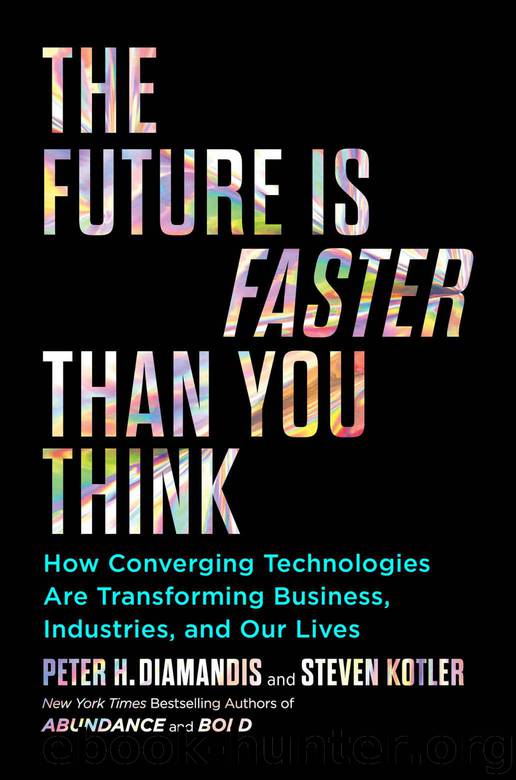The Future Is Faster Than You Think: How Converging Technologies Are Transforming Business, Industries, and Our Lives (Exponential Technology Series) by Diamandis Peter H. & Kotler Steven

Author:Diamandis, Peter H. & Kotler, Steven [Diamandis, Peter H.]
Language: eng
Format: azw3
Publisher: Simon & Schuster
Published: 2020-01-27T16:00:00+00:00
The AI Invasion
“Fintech” is the term for the convergence of technology and financial services. First colonized by networks and apps, it was then radicalized by AI and blockchain, and now serves as a global wealth redistribution mechanism. Think Robin Hood with a smartphone, taking cash away from banks and putting it back into the hands of customers.
Wherever large amounts of customer frustration encounter large piles of money, opportunity lurks. This gave rise to a company called TransferWise. By matching customers who have, say, pesos they want to turn into dollars with customers who want to change dollars into pesos, TransferWise is using a modified dating app to take on the entire foreign currency exchange market. In fact, because it’s easier to match people looking to exchange currency than it is to match people looking to date, the company reached a billion-dollar valuation in under five years.
Built on networks and apps, TransferWise is also an example of fintech’s colonization wave. The radicalized wave arose when AI entered the picture. Consider the age-old practice of “Buddy, can I borrow a dollar,” otherwise known as peer-to-peer lending. Traditionally, this is a high-risk practice—which is to say, Buddy rarely gets his dollar back. This problem only gets worse with scale. As villages turned into towns, towns expanded into cities, and cities began to sprawl, neighborly trust broke down. That’s where banks came into play—they added trust back into the lending equation.
But who needs trust when there’s data?
With AI, huge groups of people can come together, share financial information, and pool risk, becoming the peer-to-peer market now known as “crowdlending.” Prosper, Funding Circle, and LendingTree are three examples in a market expected to grow from $26.16 billion in 2015 to $897.85 billion by 2024.
A different example is the Smart Finance Group. Created in 2013 to serve China’s massive unbanked and underbanked population, Smart Finance uses an AI to comb a user’s personal data—social media data, smartphone data, educational and employment history, etc.—to generate a reliable credit score nearly instantly. With this method, they can approve a peer-to-peer loan in under eight seconds, including microloans to the unbanked. And the results speak for themselves. Roughly 1.5 to 2 million loans are taken out every month via Smart Finance.
AI is also making an impact on investing. Traditionally, this game was played by the wealthy because it’s a game of data. Financial advisors had the best data, but you needed to be wealthy enough to afford a financial advisor to access it. And advisors are picky. Since it can take more time to manage small investors than large investors, many wealth managers have investment minimums in the range of hundreds of thousands of dollars.
But AI has leveled the playing field. Today, robo-advisors like Wealthfront and Betterment are bringing wealth management to the masses. Via an app, clients answer a series of initial questions about risk tolerances, investment goals, and retirement aims, and then algorithms take over.
Actually, algorithms have already taken over. Every day, roughly 60 percent of all market trades are made by computer.
Download
This site does not store any files on its server. We only index and link to content provided by other sites. Please contact the content providers to delete copyright contents if any and email us, we'll remove relevant links or contents immediately.
Life 3.0: Being Human in the Age of Artificial Intelligence by Tegmark Max(5549)
The Sports Rules Book by Human Kinetics(4379)
The Age of Surveillance Capitalism by Shoshana Zuboff(4279)
ACT Math For Dummies by Zegarelli Mark(4043)
Unlabel: Selling You Without Selling Out by Marc Ecko(3659)
Blood, Sweat, and Pixels by Jason Schreier(3616)
Hidden Persuasion: 33 psychological influence techniques in advertising by Marc Andrews & Matthijs van Leeuwen & Rick van Baaren(3559)
The Pixar Touch by David A. Price(3431)
Bad Pharma by Ben Goldacre(3422)
Urban Outlaw by Magnus Walker(3392)
Project Animal Farm: An Accidental Journey into the Secret World of Farming and the Truth About Our Food by Sonia Faruqi(3216)
Kitchen confidential by Anthony Bourdain(3080)
Brotopia by Emily Chang(3050)
Slugfest by Reed Tucker(2997)
The Content Trap by Bharat Anand(2917)
The Airbnb Story by Leigh Gallagher(2851)
Coffee for One by KJ Fallon(2630)
Smuggler's Cove: Exotic Cocktails, Rum, and the Cult of Tiki by Martin Cate & Rebecca Cate(2531)
Beer is proof God loves us by Charles W. Bamforth(2453)
